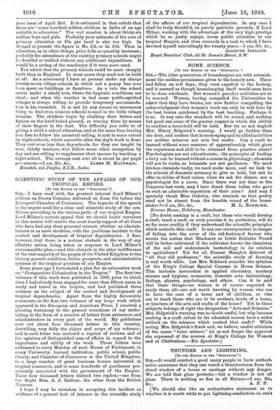HOME SCIENCE.
[To THE EDITOR OF THE " SPECTATOR."3 SIR,—The older generation of housekeepers see with astonish. ment the sudden prominence given to the homely arts. These had fallen on evil days ; they were expelled to the factory, and it seemed as though housekeeping itself would soon have to be done wholesale. But women's peculiar activities are to be rescued. Women, having compelled the Universities to admit that they have brains, are now further compelling the acknowledgment that women's work can only be well done by the best brains quickened by the best teaching. Perhaps it. is so. In any case the standard will be raised, and nothing but good can come of the greater respect in which the ability to conduct a household will be held. But• let us not neglect Mrs. Henry Sidgwick's warning. I would go further than she does, and confess that housekeeping and its allied activities are neither sciences nor arts bnt crafts. Can a craft be learned without some measure of apprenticeship which gives the experience and skill to be obtained from practice alone ? Psychologists are not educationists ; the principles of feeding a baby can be learned without a course in physiology ; chemists will not be cooks, as botanists are not gardeners. We need kitchen chemists badly, we need cooks more, and we look to the schools of domestic economy to give us both, but not to offer us tables of food values when we ask for dinner, nor a psychologist for a nurse. Since there was not time at the Congress last week, may I here thank those ladies who gave us such an admirable exposition of their aims ? And may I specially thank Miss Oakeley, who reminds us that poetry need not be absent from the humble round of the home-
maker ?—I am, Sir, &c., M. L. ECEHARD. Broome House, Didsbury, Manchester.
[No doubt cooking is a craft, but those who would develop a craft, teach a craft, or even practise it to perfection, will do so far more readily if they understand the scientific principles which underlie that craft. Is not our correspondent in danger of falling into the error of the old-fashioned farmer who scouts the notion that Blackacre or Little Bullocks Pound will be better cultivated if the cultivator knows the chemistry of the soil and understands bacteriology in its relation to agriculture ? Yet for all Farmer Mangle's distrust of " all they old professors," the scientific study of farming is well worth while. Let Mrs. Eckhard consider the syllabus of the King's College Special Courses in Home Science. This includes instruction in applied chemistry, sanitary science and hygiene, economics, domestic arts, bacteriology, biology, physics, psychology, and ethics. Can it be said that these things—no woman is of course expected to study them all—are not worth knowing by women who are to have the care of a home and of children, or who are to teach those who are to be mothers, heads of a home, or teachers of the arts and crafts of the home P Yet to these subjects belongs of right the designation "Arts and Sciences." Mrs. Sidgwick's warning was no doubt useful, but why because cooking is a craft refuse to let educated women have a wider outlook on the sciences which control that craft ? While noting Mrs. Sidgwick's frank and, we believe, useful criticism of the name "home science," let us not forget the approval she expressed of the courses at King's College for Women and at Cheltenham.—ED. Spectator.]










































 Previous page
Previous page